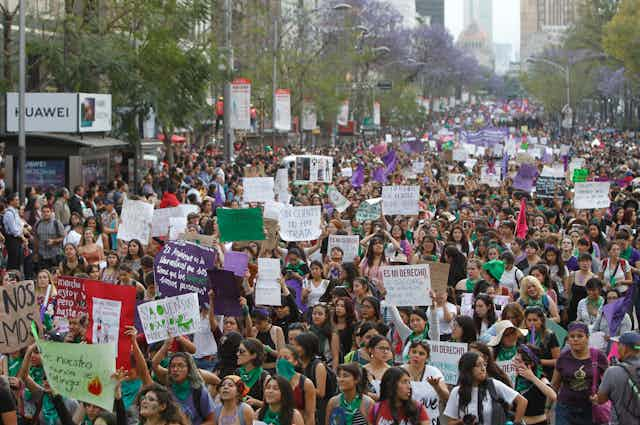The global #MeToo campaign seemed to have largely bypassed Mexico – until recently. There had been some activity through hashtags such as #MiPrimerAcoso (“My First Assault”), and individual cases such as actress Karla Souza’s accusations of rape against an unnamed Mexican director. But this created cultural ripples rather than waves – and did not reach the scale of #MeToo and its transnational offshoots, such as the French #BalanceTonPorc, the Italian #QuellaVoltaChe, the Arab world’s #AnaKaman, and #MeTooIndia.
That is not to say that harassment, abuse and violence against women is any less serious in Mexico. Sexual harassment at work is widespread throughout the country, as a recent poll released by the group Periodistas Unidas Mexicanas (Mexican Women Journalists United) demonstrated. The poll revealed that of 392 women journalists, 73% had experienced sexual harassment, with 63% of incidents carried out by male colleagues.
The earlier failure to establish a Mexican #MeToo movement was largely due to potential accusers fearing retaliatory action in a country that has tended to protect abusers over victims. Luis Miguel González of The Economist attributes this to concerns about financial cost, reputational damage, or indifference to the suffering of victims. But this all changed recently with a tidal wave of activity, via Twitter campaigns, across cultural sectors.

The origins of this Mexican #MeToo campaign began with a tweet on March 21 by political commentator Ana G. González (@anag-g), alleging abusive and violent behaviour against many women by a powerful literary figure. A Twitter account – @MeTooEscritoresMexicanos (#MeToo Mexican Writers) – soon followed, headed by the words “No estás sola” (You are not alone) and “Yo te creo” (I believe you).
This led to a proliferation of profession-specific #MeToo Mexican Twitter accounts in the fields of film, literature, journalism, academia, sport, music, theatre, law and politics – and a movement of women in the publishing industry using the hashtag #MujeresJuntasMarabunta made demands for more specific actions for equal rights.
Mexico now holds its breath as allegations against powerful men emerge with each new tweet – and heads have already rolled. The director of operations of the important Mexico City newspaper Reforma was fired following accusations of sexual harassment against him. Three employees of the Mexico City news outlets Chilango and Máspormás have also been suspended while investigations are taking place.

Accusers anonymous
Mexico was clearly in need of its own #MeToo movement, but it had to find a way to protect women for it to take root. What is unique about the Mexican #MeToo phenomenon is that these are industry-focused accounts that offer fearful accusers protection through anonymity. For instance, the account of the #MeTooEscritoresMexicanos features the words (my translation): “If you are afraid to identify your abuser, send an anonymous message with your story and the name of your abuser.”

This anonymity has empowered women to speak out, while protecting their identities. But it has drawn criticism for protecting accusers, but not the accused, and any lack of judicial oversight.
The criticisms gathered pace, for example, following the suicide of the Mexican rock musician Armando Vega Gil on April 1. The author of an anonymous post had accused him of sexually abusing her when she was 13. His suicide note proclaimed that the act was taken as a declaration of his innocence to “clear the path my son will walk in the future”.
Power imbalance
Indeed, the MeTooHombres Twitter account (that uses the English @MeTooMenPower) voices the disquiet among some men about the potentially harmful effects of this flurry of anonymous denunciations. The account administrator, who goes by the name of Dante, has spoken against the anonymity of #MeToo Mexico and has criticised what he sees as the lynch mob mentality of such social media campaigns.
While the pinned tweet at the top of the feed asserts that it is not a site against women, but a space for men, the use of the English word “power” in the Twitter handle, does suggest that for some men this is a gender war. The assertion of such traditional notions of masculinity will certainly make many women seeking cultural shifts uncomfortable.
Women are turning to Twitter to denounce their abusers precisely because the legal system and other insitutuions have failed to offer them protection and justice. In an interview with me, for example, the renowned film critic Fernanda Solórzano summarised the debate thus:
The lack of a legal system that can deal efficiently and judiciously with accusations of assault and abuse has meant that these fora for anonymous accusations are the only spaces for women to find support and a community that backs them. On the other hand, the anonymity polarises a society that should collectively engage with deep-rooted societal and educational problems.
Despite the flaws inherent in anonymous Twitter campaigns, #MeToo Mexico in all its multiple forms is shaking up cultural life in the country. Women and girls have been given a space in which to speak out, and individual men will be more likely to check their behaviour from everyday sexism to violent assaults and rape. This is how cultures change in the digital age.

